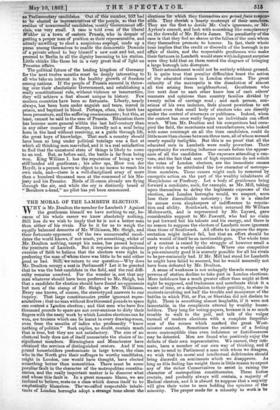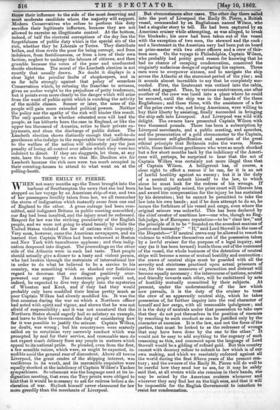THE MORAL OF THE LAMBETH ELECTION.
WHY is Mr. Doulton the member for Lambeth ? Against the gentleman himself we have nothing to say, be- Cause of his whole career we know absolutely nothing. Still less do we wish to imply that he is not a better man than either of his rivals. Far be it for us to weigh the equally balanced demerits of Mr. Wilkinson, Mr. Sleigh, and their fortunate opponent. Of the two unsuccessful candi- dates the world knows, if not much, yet something, whilst of Mr. Doulton nothing, except his name, has passed beyond the precincts of Lambeth. But it requires no stupendous exercise of faith to believe that the electors were right in preferring the man of-whom there was little to be said either good or bad. Still, we return to our question—Why does Mr. Doulton occupy a seat in Parliament ? Let it be granted that he was the best candidate in the field, and the real diffi- culty remains unsolved. For the wonder is, not that any man whatever should have been preferred to Mr. Sleigh, but that a candidate for election should have found no opponents but men of the stamp of Mr. Sleigh or Mr. Wilkinson. Every one knows, of course, the stereotyped answers to our inquiry. That large constituencies prefer ignorant repre- sentatives ; that no man without five thousand pounds to spare can contest a Lyndon election ; and that men who have five thousand pounds to spare are not over-anxious to dirty their fingers with the nasty work by which London elections can be won, are truisms which can be learnt in every drawing-room, even from the mouths of ladies who professedly " know nothing of politics." Such replies, no doubt, contain much that is true, but they are not satisfactory. The size of an electoral body does not of itself necessitate the choice of in- significant members. Birmingham and Manchester have obtained the services of distinguished orators. And if ten pound householders predominate in large towns, the class who in the North give their suffrages to worthy candidates, might in London, one would have thought, have elected something better than nonentities. There must be some peculiar fault in the character of the metropolitan constitu- encies, and the really important matter is to discover what and whose this fault is. In a great measure blame, we are inclined to believe, rests on a class which deems itself to be emphatically blameless. The' so-called respectable inhabi- tants of London boroughs adopt a strange tone about the elections for which they themselves are primtl facie rearm. sible. They cherish a hearty contempt of their members- They are the first to deride Mr. Cox's ignorance, or Mr. Ayrton's conceit, and look with something like complacency on the downfal of Mr. Edwin James. The peculiarity of the case is that they feel no shame at the follies of the men whom they themselves promote to honour. In fact, their whole tone implies that the credit or discredit of the borough is no affair of theirs, and the respectable gentlemen who make their fortunes in Lambeth would stare with indignant surprise were they told that on them rested the disgrace of bringing a large borough into disrepute.
Their astonishment would not be entirely without ground. It is quite true that peculiar difficulties beset the action of the educated classes in London elections. The great calamity of the metropolis is the dissolution of almost all ties arising from neighbourhood. Gentlemen who live next door to each other know less of each others' manners and opinions than country families divided by twenty miles of carriage road ; and each person, con- scious of his own isolation, feels almost powerless to act against even that small body of electors who are directly under the control of attorneys or publicans. Indeed, when the contest has once really begun no individuals can effect much. When Mr. Doulton and his competitors had occu- pied the field, the merchants and manufacturers, who looked with some contempt on all the then candidates, could do littlemore than choose between three men, all of whom seemed nearly equally ineligible. Bat this is no proof that all the educated men in Lambeth were really powerless. Their opportunity for exerting influence occurs before the appear- ance of all the candidates. The expenses attending a can- vass, and the fact that men of high reputation do not solicit the votes of London electors, are the immediate causes to which may be attributed the low character of metropo- litan members. These causes might each be removed by energetic action on the part of the wealthy inhabitants of Marylebone or Finsbury. Let a body of gentlemen bring forward a candidate, such, for example, as Mr. Mill, taking upon themselves to defray the legitimate expenses of the election, and London boroughs would, we suspect, soon lose their discreditable notoriety ; for it is a slander to accuse even shopkeepers of indifference to reputa- tion and ability. Southwark, which returned Sir William Molesworth, and is represented by Mr. Layard, gave considerable support to Mr. Fawcett, who had no claim to put forward but his talents and his energy, and there is no reason to suppose the electors of Lambeth more ignorant than those of Southwark. All efforts to improve the repre- sentation might indeed fail, but that an effort should be made would of itself be an inestimable gain. The whole tone of a contest is raised by the struggle of however small a party to elect a worthy candidate. Where one competitor is pre-eminently good it is scarcely possible for all his rivals to be pre-eminently bad. If Mr. Mill had stood for Lambeth he might have failed to succeed, but he would assuredly not have been defeated by Mr. Doulton. A sense of weakness is not unhappily the sole reason why persons of station decline to take part in London elections. Mere indolence has a much greater effect than might at first sight be supposed, and tradesmen and merchants think it a waste of time, or a degradation to their gentility, to share in contests involving not half the trouble and annoyance of the battles in which Pitt, or Fox, or Sheridan did not disdain to fight. There is something almost laughable, if it were not lamentable, in the complaints uttered by wealthy house- holders. They long for voting-papers, because it is so much trouble to walk to the poll, and talk of the vulgar turmoil of modern elections with a complete forgetful- ness of the scenes which marked the great West- minster contest. Sometimes the existence of a feeling more contemptible than even indolence or fastidiousness may be detected. Men are found who positively enjoy the defects of their own representative. We cannot, they inti- mate, have a member of our own way of thinking, and if we are to send to Parliament a man with whom we disagree, we wish that his moral and intellectual deficiencies should bring discredit on sentiments which we disapprove. As long as this feeling has weight there is little reason to expect any of the richer Conservatives to assist in raising the character of metropolitan constituencies. These bodies contain, and probably always will contain, a majority of Radical electors, and it is absurd to suppose that a majority will give their votes to men holding the opinions of the minority. The proper mode for a minority to work is to throw their influence to the side of the most deserving and most moderate candidate whom the majority will support. Modem Conservatives who refuse to perform this duty sacrifice their legitimate influence, because they are not allowed to exercise an illegitimate control. At the bottom, indeed, of half the electoral corruptions of the day lies the forgetfulness of public duty which is the special sin of the rich, whether they be Liberals or Tories. They distribute bribes, and then revile the poor for being corrupt, and from indolence, from fastidiousness, or from a love of their own faction, neglect to undergo the labours of citizens, and then grumble because the votes of the poor and uneducated decide elections. The moral of the Lambeth election is not exactly that usually drawn. No doubt it displays in a clear light the peculiar faults of shopkeepers, and in so far tells strongly against that policy of senseless Conservatism which, by refusing the franchise to artisans, gives an undue weight to the prejudices of petty tradesmen, but it points even more clearly to the danger which will arise from the want of public spirit which is numbing the activity of the middle classes. Sooner or later, the mass of the people will gain more extended political powers. Neither the policy nor the apathy of the rich will hinder this result. The only question is whether educated men will lead the people, as has hitherto been the case in England, or like the upper ten thousand of America, retire to their private en- joyments, and shun the discharge of public duties. The Lambeth election shows distinctly enough that well-to-do gentlemen who indulge in the respectable vice of indifference to the welfare of the nation will ultimately pay the just penalty of losing all control over affairs which they were too indolent to direct. If they are sluggards, let them, at any rate, have the honesty to own that Mr. Doulton sits for Lambeth because the rich men were too much occupied in their counting-houses to attend to what went on at the polling-booth.































 Previous page
Previous page